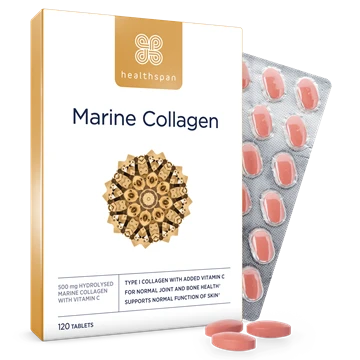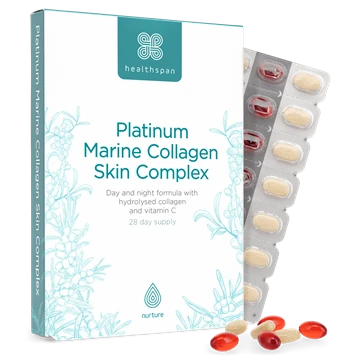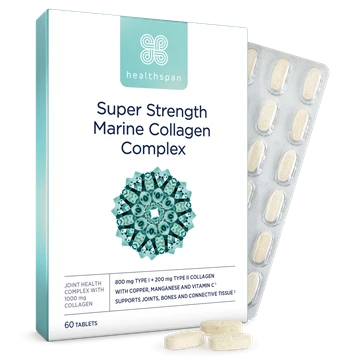We explain what collagen is and why it matters for skin health, elasticity and radiance — plus the best type of collagen for skin and how much to take daily.
🕒 7 min read
What is collagen?
Collagen is the most vital and prominent protein in the human body, acting as the fundamental building block for our skin, hair, nails, bones, and connective tissues. It constitutes an impressive 70–80% of the skin's dry weight, providing the structural framework that keeps it firm, smooth, and resilient.
While our bodies produce collagen naturally, we can also obtain it from animal-based food sources like bone broth, chicken, and oily fish. However, consuming enough of these foods to make a significant impact can be challenging, which is why targeted collagen supplements have become a popular and convenient way to support your skin from within.
What does collagen do?
Collagen is responsible for providing strength, structure, and support to the deeper layers of the skin (the dermis). This dense network of protein fibres is what gives youthful skin its characteristic plumpness, firmness, and elasticity. It also plays a crucial role in skin hydration by supporting the production of hyaluronic acid, helping your skin retain moisture for a healthy glow.
What are the different types of collagen?
Scientists have identified at least 28 different types of collagen, but three main types are responsible for the majority of the collagen found in our bodies. Understanding these can help you choose the right support for your needs.
- Type I – This is the most abundant type, forming the foundation of your skin, bones, tendons, and ligaments. It is crucial for maintaining skin integrity and minimising fine lines.
- Type II – Primarily found in elastic cartilage, this type is essential for cushioning joints and providing support.
- Type III – Often found alongside Type I, this type supports the structure of muscles, organs, and arteries.
What is bovine collagen?
Bovine collagen is derived from cow hides. It is a rich source of both Type I and Type III collagen, making it a good all-around supplement for supporting not only the skin but also joint and gut health. Due to its wide availability, it is one of the most common and cost-effective types of collagen supplements.
What is marine collagen?
Marine collagen is sourced from the skin and scales of fish. It consists almost exclusively of Type I collagen, the primary type found in human skin. Marine collagen peptides are known for having a smaller particle size and lower molecular weight compared to other types, which allows for superior bioavailability and absorption by the body.
Marine Collagen
For healthy skin and beauty
- 500 mg hydrolysed marine collagen
- Great value daily collagen tablets
- Vitamin C for added joint and bone health benefits
What is the best type of collagen for skin?
For individuals focused specifically on skin health, marine collagen is widely considered the superior choice. Its high concentration of Type I collagen directly supports the skin's structure, helping to improve elasticity and hydration. Furthermore, its smaller peptide size means the body can absorb and utilise it more efficiently, delivering the essential amino acids to the dermis where they can stimulate your skin’s own collagen production.
Platinum Marine Collagen Skin Complex
Slow the signs of ageing with hydrolysed marine collagen peptides
- Premium day & night formula using a highly absorbable collagen
- Dermaval™ improves skin tone and overall appearance
Collagen benefits for skin
As we get older, our body's natural collagen production begins to decline. This process accelerates significantly around menopause due to falling oestrogen levels, leading to common signs of ageing. Supplementing with collagen can help counteract these effects. Some of the main benefits include:
- Enhances skin hydration: By supporting the skin's structure and its ability to retain moisture, collagen helps to combat dryness for a smoother, more supple complexion.
- Improves elasticity and firmness: Replenishing collagen levels helps to reinforce the skin's internal framework, improving firmness and restoring youthful bounce.
- Reduces the appearance of fine lines and wrinkles: By rebuilding the protein network in the dermis, collagen helps to plump the skin from within, smoothing out fine lines and wrinkles.
How effective are collagen supplements for the skin?
There is strong scientific evidence to suggest that collagen supplements are effective for improving skin health. When you ingest hydrolysed collagen (or collagen peptides), it is absorbed into the bloodstream as small amino acid chains. These peptides then travel throughout the body and stimulate specialised cells in the skin called fibroblasts to produce more collagen and hyaluronic acid.
One study found that women who took 2.5–5g of collagen for eight weeks saw significant improvements in skin elasticity and hydration compared to a placebo group. Unlike topical creams, where the collagen molecules are too large to penetrate the skin’s deeper layers, oral supplements work systemically to provide the building blocks your skin needs to repair and rejuvenate itself.
What to look for in a collagen supplement
To ensure you’re getting the most benefit for your skin, look for these key features when choosing a collagen supplement:
- Hydrolysed Marine Collagen: Choose a supplement that specifies “hydrolysed collagen” or “collagen peptides.” This means the protein has been broken down into smaller, easily digestible chains for maximum absorption. Marine collagen is the best source for skin benefits.
- Added vitamin C: Vitamin C is an essential cofactor for collagen synthesis. Without adequate vitamin C, your body cannot effectively form new collagen, making it a crucial addition to any formula.
Super Strength Marine Collagen Complex
1,000 mg collagen peptides per tablet
- Beauty and skin complex
- With added type II collagen for joint support
- Added copper, manganese and vitamin C
- One-a-day formula
How much collagen should you take per day for skin?
Experts agree that most people see maximum benefits of collagen with a daily intake of 2.5 grams to 10 grams (2,500mg to 10,000mg). However, the optimal dose can depend on the specific product and your individual goals. It is always best to follow the recommended dosage on the specific supplement you are taking or speak to a healthcare professional to find the right amount for you.
How long does collagen take to work on skin?
While some people may notice initial improvements in skin hydration within a few weeks, patience and consistency are key. For more significant results, such as improved firmness and a reduction in fine lines, it typically takes at least 8 to 12 weeks of consistent daily use. This allows your body sufficient time to absorb the peptides, stimulate collagen production, and begin rebuilding the skin's structure.
Healthspan Collagen Supplements
Healthspan’s collagen range has been developed to support skin health from within, using high-quality marine collagen peptides for maximum absorption. Platinum Marine Collagen Skin Complex combines 6,000mg of hydrolysed marine collagen with vitamin C, hyaluronic acid and biotin – a comprehensive formula designed to help improve skin elasticity, hydration and radiance. For a more streamlined option, Super Strength Marine Collagen Complex provides 1,000mg of highly absorbable collagen peptides with added vitamin C, perfect for those looking for an effective daily boost. Both are convenient, scientifically formulated options to help replenish your natural collagen levels and keep skin looking firm, smooth and healthy.
Explore our full collagen range to find the right supplement to support your skin.
How to support natural collagen production
Alongside taking supplements, protecting the collagen you already have is vital. Certain lifestyle factors can accelerate collagen degradation, so it’s important to minimise their impact.
- Limit your intake of sugar and refined carbohydrates, which can harden and damage collagen fibres.
- Avoid smoking, as it significantly reduces collagen synthesis and restricts nutrient delivery to the skin.
- Manage stress and prioritise quality sleep to lower stress hormones that break down collagen.
- Protect your skin from UV damage by wearing a broad-spectrum sunscreen every day, all year round.
Collagen plays a vital role in keeping skin firm, smooth and radiant, but as levels naturally decline with age, supporting your body with the right supplement can make a real difference. By choosing a high-quality marine collagen formula and combining it with healthy lifestyle habits, you can help maintain your skin’s structure, hydration and youthful glow for years to come.









